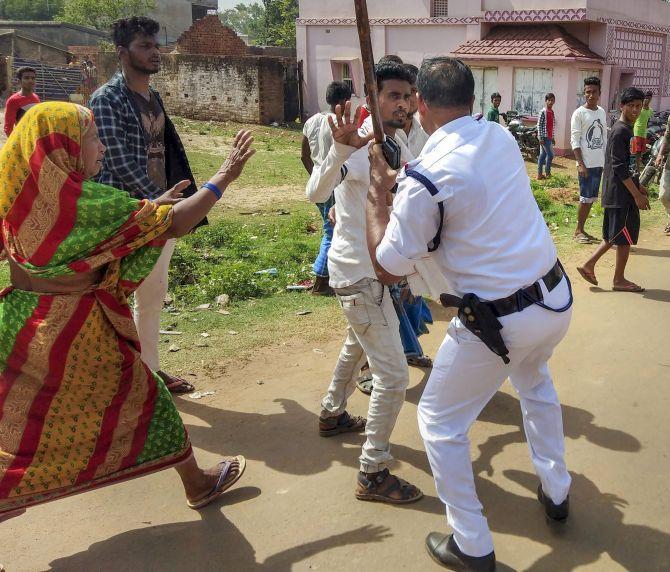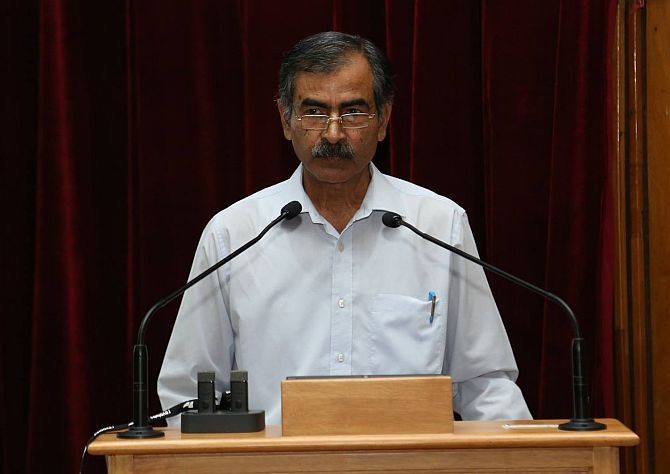 | « Back to article | Print this article |
'ADR's success is its ability to remain non-partisan for a very long period, sheer professionalism and tenacity, and that makes it one of the good things to happen to our democracy.'
Shubhomoy Sikdar reports.

A nondescript building in South Delhi's Gautam Nagar houses a critical nodal point for Indian democracy.
Inside, a retired army officer is marshalling his troops, mostly young professionals, to take on a formidable adversary -- electoral malpractice.
Five of the seven phases of the 2019 Lok Sabha elections were over when I meet Anil Verma who retired from the army as a major general, at the central office of the Association for Democratic Reforms (ADR), an organisation that aims to increase voter awareness through its comprehensive reports and does advocacy for other reforms.
Verma took over at ADR in 2013.
State elections and outreach programmes mean they are always busy, but during Lok Sabha elections matters are overflowing for the central core team of 30-odd people.
"Each report on the antecedents of a candidate, no matter where an election is being held, is prepared here. The biggest challenge is data entry. There are 8,000 to 9,000 candidates. Some of the affidavits are phenomenally long. There may be four pages of criminal cases and as many pages of assets. Going through them takes time and then starts the process of reviews, we do at least three because getting even a single digit in an IPC section wrong can wreak havoc," says General Verma.
The chief source of data is the Election Commission Web site and ADR takes it upon itself to simplify it for the masses through traditional media or, of late, channels such as WhatsApp and Facebook.
ADR has two Web sites -- the main ADR Web site adrindia.org and myneta.info, which has a database of almost 200,000 people who have contested elections 2003 onwards.
"Last general elections, the My Neta server crashed because of the heavy traffic. This time, we got three servers and so far, there has been no problem," he says.
But even these relatively small changes entail more work and higher operational costs.
So while there is a steady stream of donations, the money is spent in operational costs.
As General Verma puts it, the room for growth is small.
"We hire people who have the mindset of working in the social sector, who have a fire in their bellies and understand the constraint and work without corporate-level expectations."
Naveen Singh Moni (28) from Pithoragarh in Uttarakhand joined ADR in 2008, when five-six people worked here.
The team has expanded almost six times.
"I joined because I could study and earn some money, but gradually my interest grew. Today, the motivation is doing something for society."
His colleague, Shelly Mahajan (27), has been at ADR for four months.
Mahajan, who holds a postgraduate degree in politics, feels ADR helps her understand how India's polity works.
For those who don't have access to the Internet, ADR runs voter awareness campaigns using padyatras, nukkad nataks, distribution of leaflets and mandalis to educate voters.
Given its limited resources, this election ADR opted for 60 districts in India where the most number of dubious candidates were in the fray.

This is ADR's 20th year of existence.
In 1999, a group of Indian Institute of Management professors filed a public interest litigation with the Delhi high court requesting the disclosure of the criminal, financial and educational background of the candidates contesting elections.
Based on this, the Supreme Court in 2002 made it mandatory for all candidates to disclose criminal, financial and educational background prior to the polls.
On the way there have been many watershed moments where ADR's PILs or intervention have brought about reforms.
As Swaraj India Abhiyaan President Yogendra Yadav puts it: "ADR's success is its ability to remain non-partisan for a very long period, sheer professionalism and tenacity, and that makes it one of the good things to happen to our democracy."
General Verma derives hope from micro-level impact, too, such as the belief that ADR's outreach programmes have prevented some bad apples from winning local body elections.
Yet challenges remain as those with huge assets and criminal backgrounds keep making it to Parliament or the assemblies.
Former IIM Ahmedabad professor and founding member Jagdeep Chhokar paints a grim picture.
"If anything, we are farther away from the vision we had 20 years ago. The hope is that somehow the people in India will realise that it is important to regulate the functioning of political parties by law and unless these parties, which are supposedly the pillars of Indian democracy, become democratic in their internal functioning, the notion of democracy in this country will remain a distant dream."